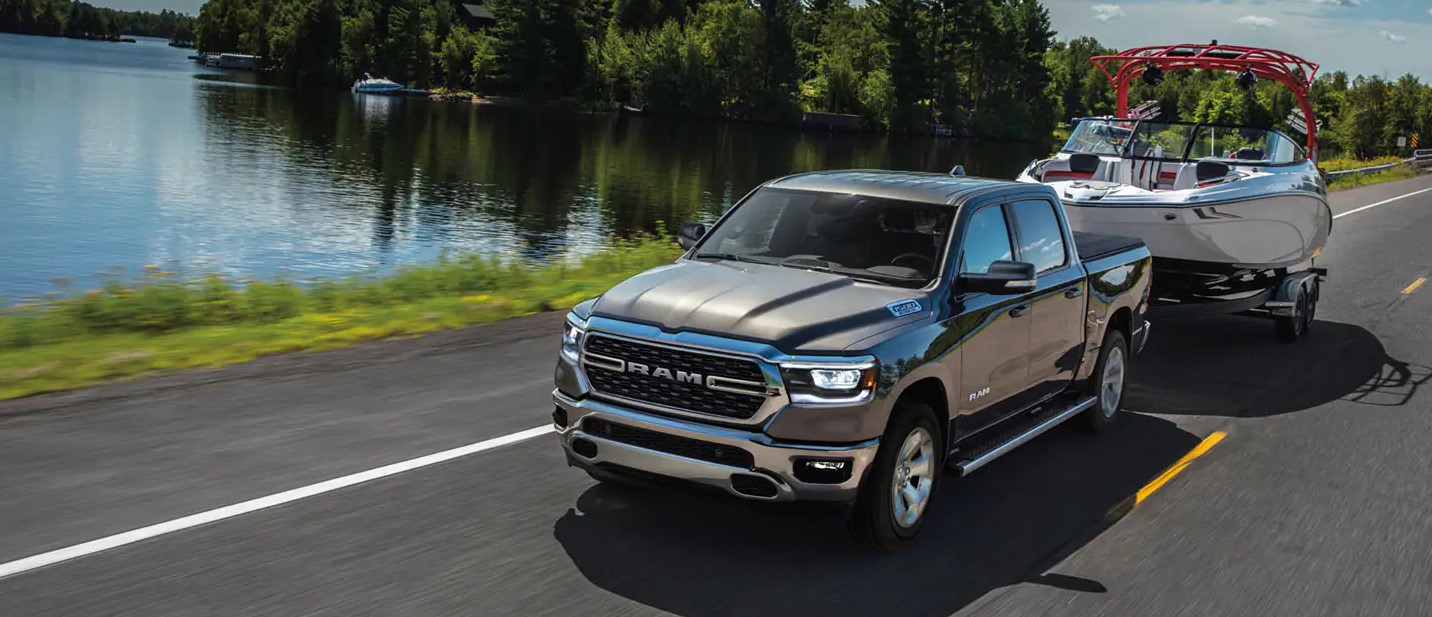RAM is celebrating nearly a decade of EcoDiesel production and innovation with a final opportunity for consumers to order the RAM 1500 EcoDiesel model. Production for the 2023 RAM 1500 EcoDiesel will come to an end in January 2023, marking the end of an era that began with its introduction in 2014.
The EcoDiesel V-6 engine has been a game-changer for RAM, achieving several powertrain milestones unique to the brand. It boasts the highest half-ton diesel torque rating and towing capacity, and it was the first to exceed 1,000 miles of range. As RAM Brand CEO Mike Koval Jr. noted, “this final production run is a way to honor the achievements of the EcoDiesel and provide loyal enthusiasts with one last chance to own the truck they adore.
As RAM looks to the future, the brand is focusing on electrification. A battery-electric vehicle (BEV) pickup truck is set to launch in 2024, with electrified options expected for the majority of its segments by 2025 and in all segments by 2030. The 2023 RAM 1500 EcoDiesel will still be available for a limited time in Crew Cab 4×4 models, including Tradesman, Big Horn/Lone Star, Laramie, Limited Longhorn, and Limited trims.
This farewell to the RAM 1500 EcoDiesel marks not just the end of a remarkable chapter in the brand’s history but also the beginning of an exciting new era of electrified trucks.
Overview of The EcoDiesel 3.0-Liter V-6
The RAM 3.0-liter V-6 EcoDiesel engine is an innovative powertrain option available in RAM 1500 pickup trucks. The EcoDiesel engine was designed to provide an ideal balance between performance, fuel efficiency, and reduced emissions. Here are some key features and highlights of this engine:
Performance: The 3.0-liter V-6 EcoDiesel engine delivers impressive performance figures for a diesel engine in its class. It generates around 260 horsepower and 480 lb-ft of torque, providing ample power and towing capability for a variety of tasks and recreational activities.
Fuel Efficiency: One of the main selling points of the EcoDiesel engine is its fuel efficiency. This engine provides better fuel economy compared to its gasoline counterparts, with EPA-rated fuel economy figures of up to 22 mpg city and 32 mpg highway (in the 2020 model, for example). These numbers may vary depending on the model year and specific configuration of the truck.
Emissions: The EcoDiesel engine uses selective catalytic reduction (SCR) and diesel exhaust fluid (DEF) to reduce nitrogen oxide (NOx) emissions. This technology helps the engine meet stringent emissions standards and reduces its environmental impact.
Durability: The 3.0-liter V-6 EcoDiesel engine is designed for durability and reliability, featuring components such as a compacted graphite iron (CGI) engine block, a forged steel crankshaft, and aluminum cylinder heads.
The EcoDiesel engine is available for a limited time in various RAM 1500 models and trims, including the Tradesman, Big Horn, Laramie, Rebel, and Limited, among others. This engine option caters to customers who prioritize fuel efficiency, towing capability, and reduced emissions.
History of The EcoDiesel 3.0-Liter V-6
The RAM 1500’s EcoDiesel 3.0-Liter V-6 engine has been an innovative and influential powertrain in the light-duty truck segment since its introduction in 2014. The EcoDiesel engine was designed to offer RAM 1500 owners a compelling alternative to traditional gasoline engines, with improved fuel efficiency, torque, and towing capabilities. Here’s a look at the history and legacy of this groundbreaking engine:
Introduction in 2014: The 3.0-liter V-6 EcoDiesel engine was first introduced in the RAM 1500 for the 2014 model year. It marked a significant milestone for the brand as it was the first time a light-duty pickup truck in the United States offered a diesel engine option in several decades. The engine delivered 240 horsepower and 420 lb-ft of torque.
Fuel Efficiency: One of the primary selling points of the EcoDiesel engine was its exceptional fuel efficiency compared to gasoline-powered alternatives. The EPA rated the 2014 RAM 1500 EcoDiesel at 20 mpg city and 28 mpg highway for the 2WD model, making it the most fuel-efficient full-size pickup truck available at the time. The fuel efficiency figures improved even further with the upgraded 2020 model, achieving up to 22 mpg city and 32 mpg highway.
Towing and Torque: The EcoDiesel engine provided RAM 1500 owners with impressive torque and towing capabilities. The engine offered the highest half-ton diesel torque rating and towing capacity, making it an ideal choice for those who needed a powerful yet efficient workhorse.
Upgrades and Improvements: In 2020, RAM introduced a significantly updated EcoDiesel engine for the RAM 1500. This second-generation engine featured improved performance, with output figures of 260 horsepower and 480 lb-ft of torque. The engine’s design was also refined, with weight reduction measures and enhanced efficiency.
Environmental Considerations: The EcoDiesel engine used selective catalytic reduction (SCR) and diesel exhaust fluid (DEF) to minimize nitrogen oxide (NOx) emissions. These technologies allowed the engine to meet strict emissions standards and reduce its overall environmental impact.
End of Production: In September 2022, RAM announced that production of the 2023 RAM 1500 EcoDiesel would conclude in January 2023, marking the end of the EcoDiesel era. The brand is focusing on the future, with plans to offer a battery-electric vehicle (BEV) pickup truck in 2024 and electrified options across its entire lineup by 2030.
The RAM 1500’s EcoDiesel 3.0-Liter V-6 engine has left an indelible mark on the automotive industry, proving that diesel powertrains can offer an attractive combination of power, efficiency, and environmental responsibility in the light-duty truck segment. Its legacy will no doubt continue to influence the development of future powertrains, as the industry moves towards electrification and alternative fuel options.



